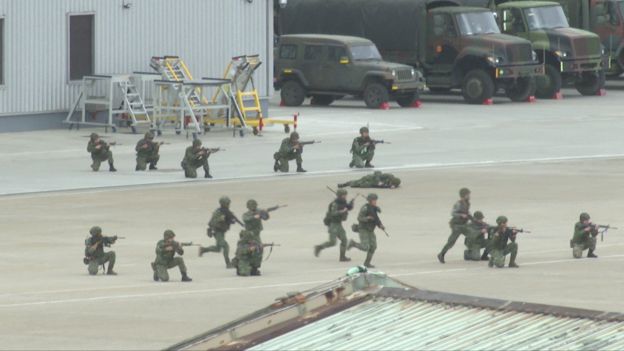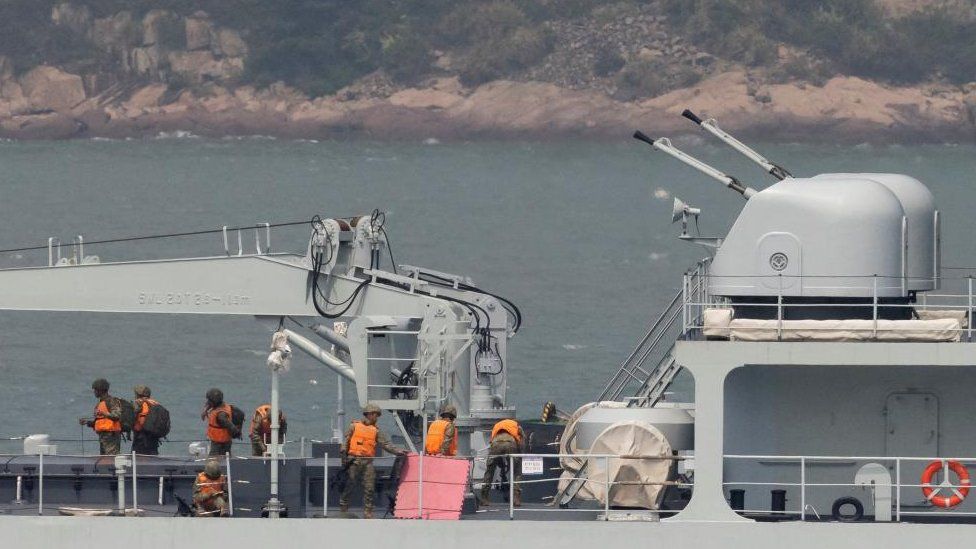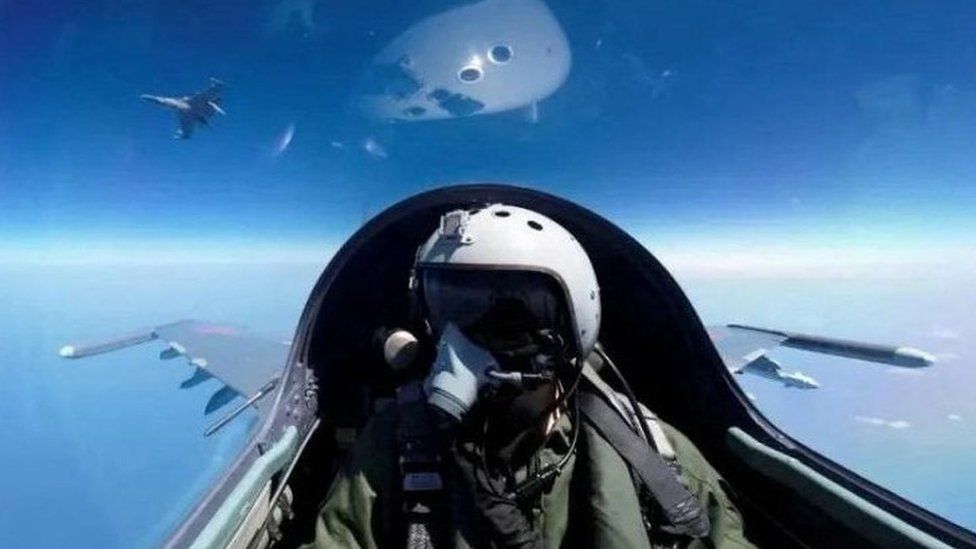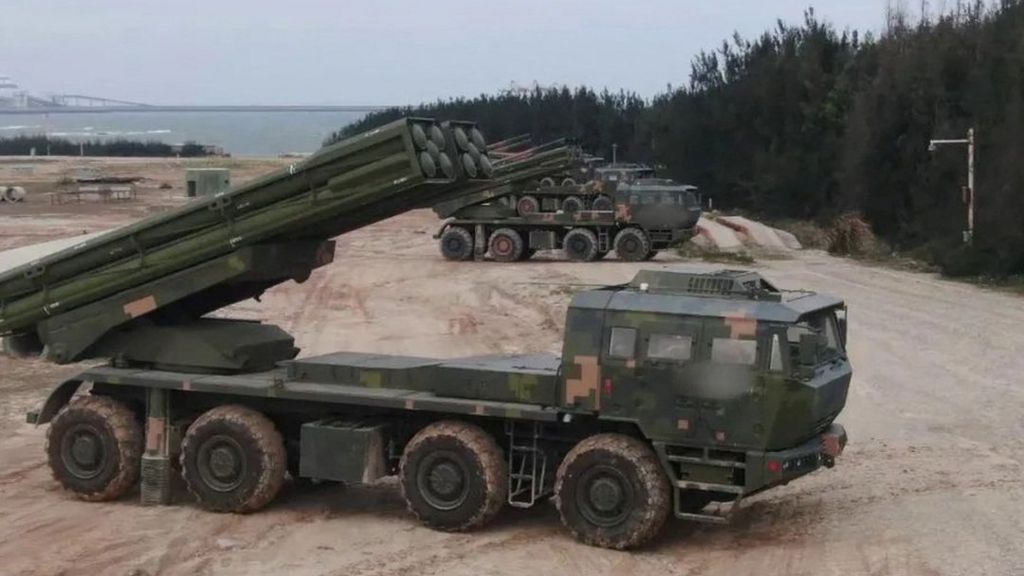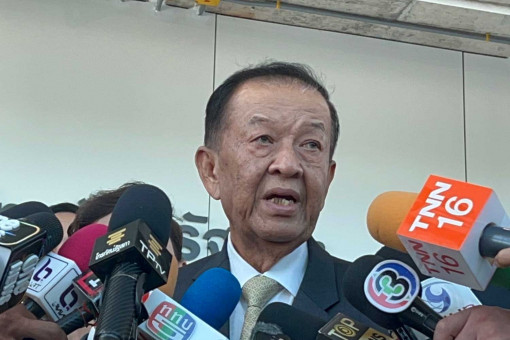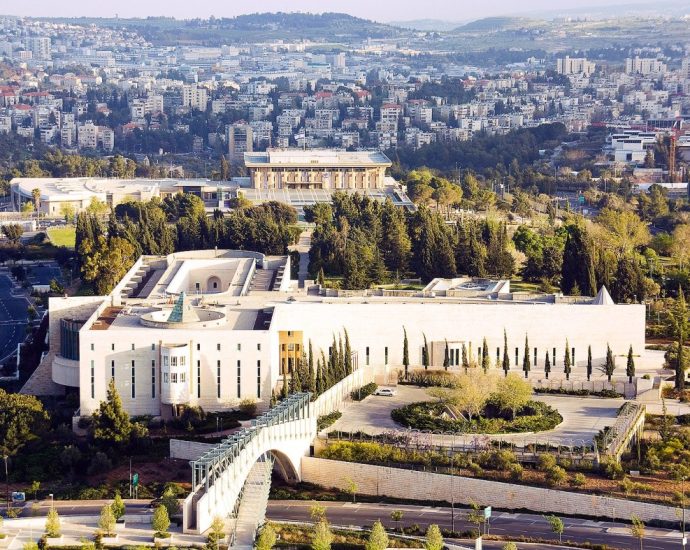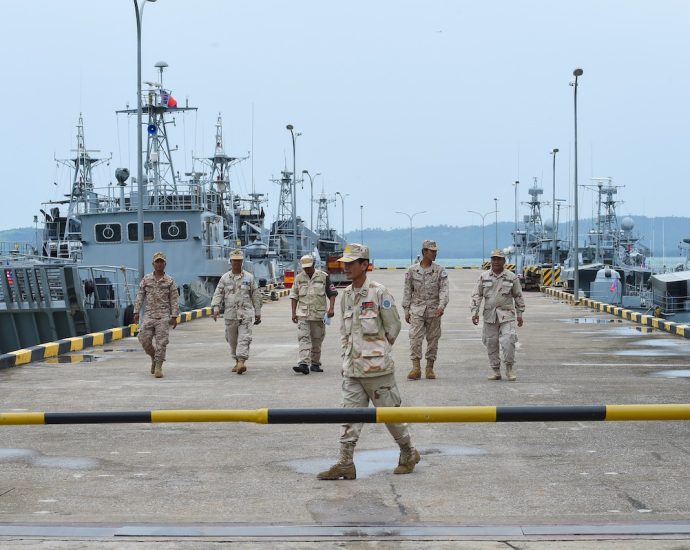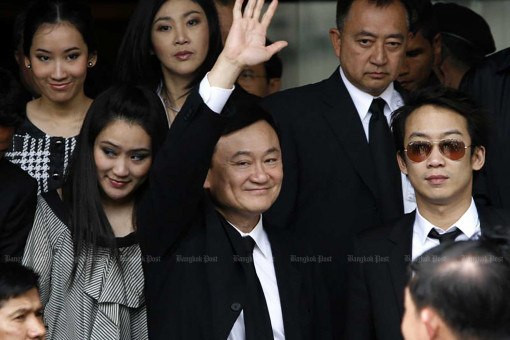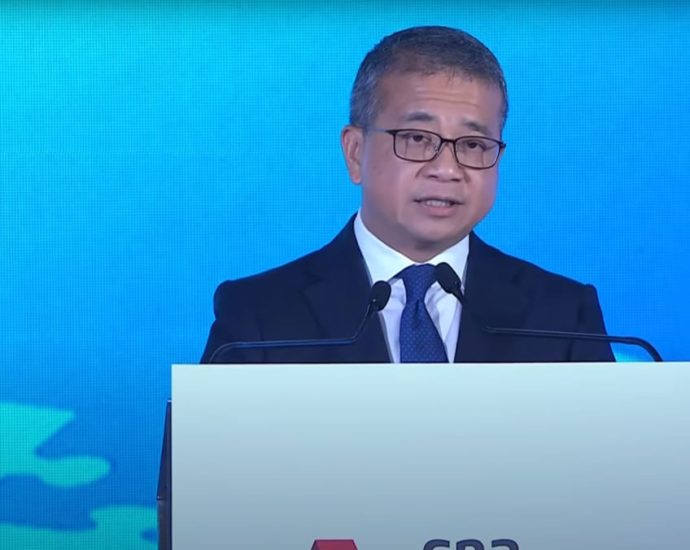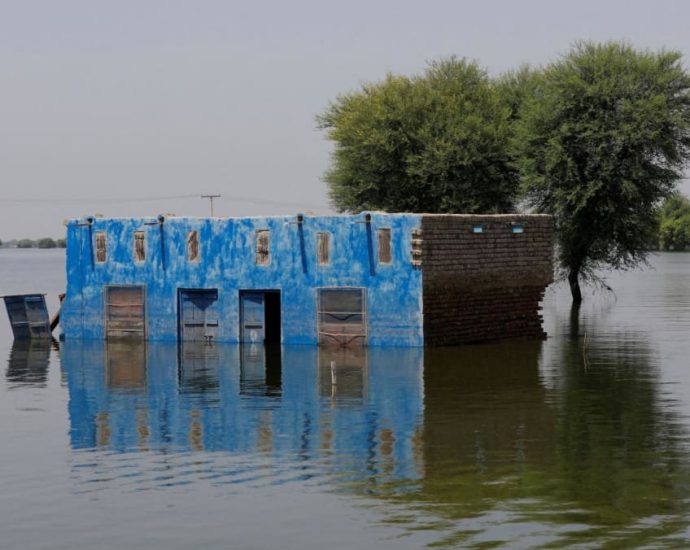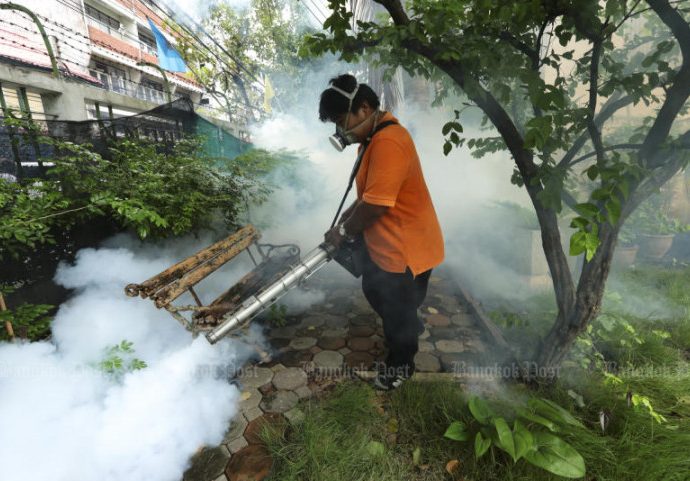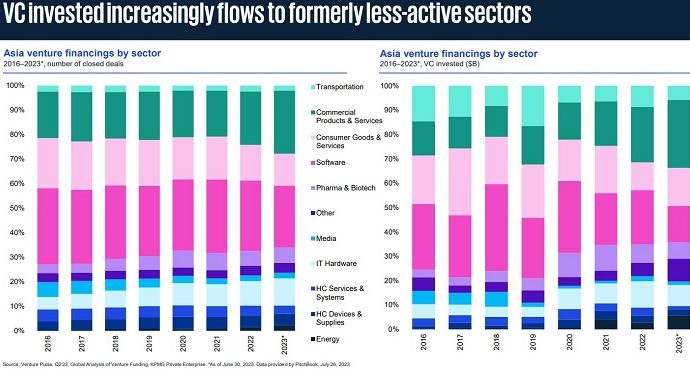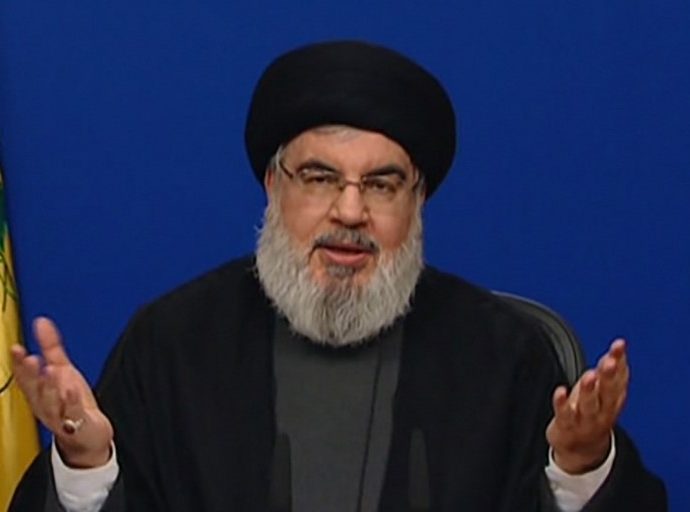Han Kuang: Taiwan practices to repel a Chinese invasion
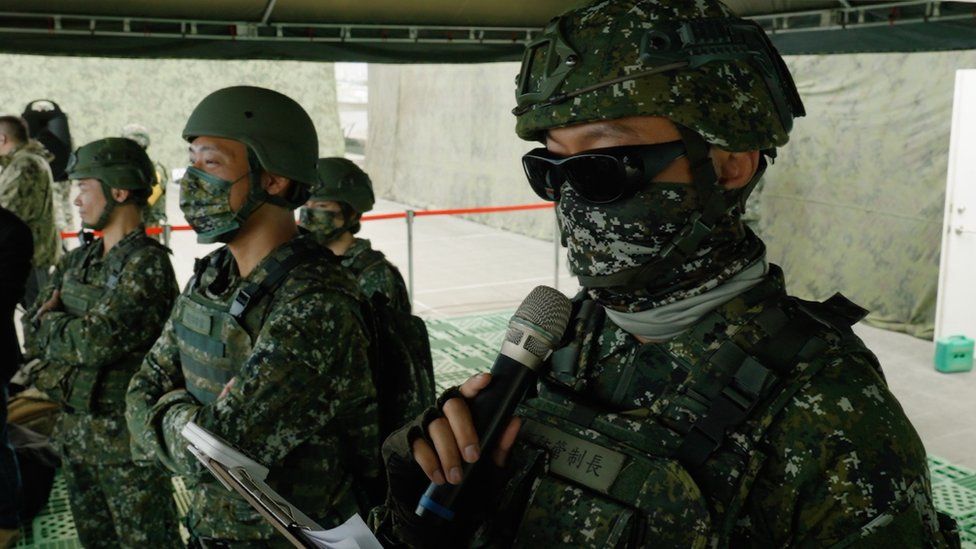
The first sign of invasion comes with a group of attack helicopters flying low over the northern Taiwan coast.
Following close behind, a bigger group of dark green assault helicopters loaded with troops.
Then from behind low sand-dunes, two dozen amphibious assault vehicles move with surprising speed along the wide beach, their tracks churning up the sand. Soon they are disgorging scores of soldiers.
For a few minutes it seems Taiwan’s defenders have been caught with their pants down.
But then a siren wails, heavily armed soldiers are running along trenches, the rat-tat-tat of heavy machine gun fire. Out of nearby woods come battle tanks and armoured vehicles, their guns booming.
Apache attack helicopters roar in over the hills, strafing the invading troops. The beach erupts with loud explosions. The invaders are pinned down, then driven back. The invasion is vanquished. Taiwan is safe.
It’s all taken about 20 minutes.
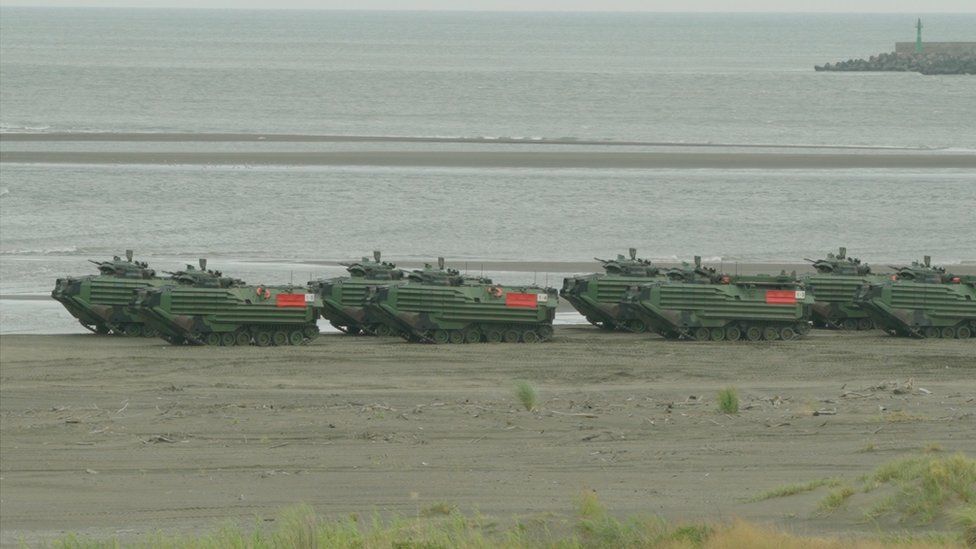
“Today we have shown that we will do our utmost to defend and protect our country” the commanding officer tells the gaggle of reporters standing on a roof top watching all this unfold. “We are confident that through these exercises we will be ready to respond to any situation.”
Really?
A cynic watching today might say the battle wasn’t terribly realistic. The invading forces were tiny. The defenders were all waiting for them. It was all entirely scripted, and victory came rather too quickly and too easily.
But that cynic would be a little unfair.
I remember being taken around Taiwan’s annual Han Kuang military exercises as a young reporter 25 years ago. Then it really was a show for the cameras.
“I would say this is an inflection point.” Says Alessio Palatano, Professor of war studies at King College in London. “There was a perception internationally that Taiwan was complacent about its military. This week you really get a sense of that they are starting to grapple seriously with significant changes”.
It’s clear Taiwan is learning from what’s happened in Ukraine.
On the first day of the war there, Russian troops grabbed an airport on the edge of Kiev and used it as a base to assault the Ukrainian capital. It failed.
So now Taiwan is focused on its most vulnerable points – places China would have to take control of if it were to successfully invade the island.
Those include the beaches of northern Taiwan, but also the main international airport and its main seaports.
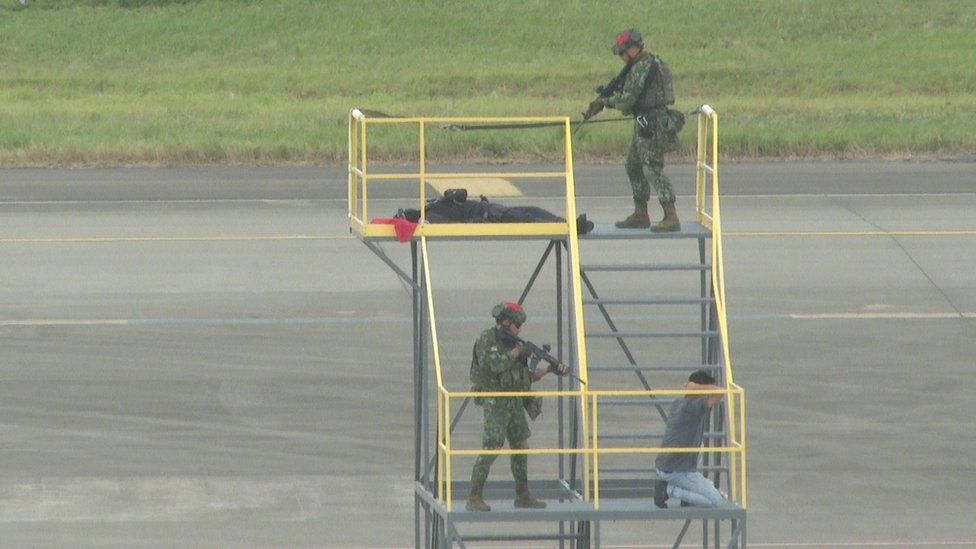
But Professor Palatano says Ukraine has been crucial in another way. It has broken the complacent belief that China would never attack the island.
“The war in Ukraine shattered this fundamental assumption that war is a thing of the past. That it’s not going to happen anymore. And once that sort of myth is shattered, then everything else starts to be re-evaluated.”
For those who’ve been listening, China’s president Xi Jinping has been making it clear for several years that attacking Taiwan absolutely is an option.
And China is building the air and naval forces to make that possible.
President Xi has a clear timetable. By 2027 China should have the capability to fight and win a regional conflict. By 2035 It should be a world class military power. By 2049 the rejuvenation of the motherland should be complete .
For Taiwan the clock is ticking.
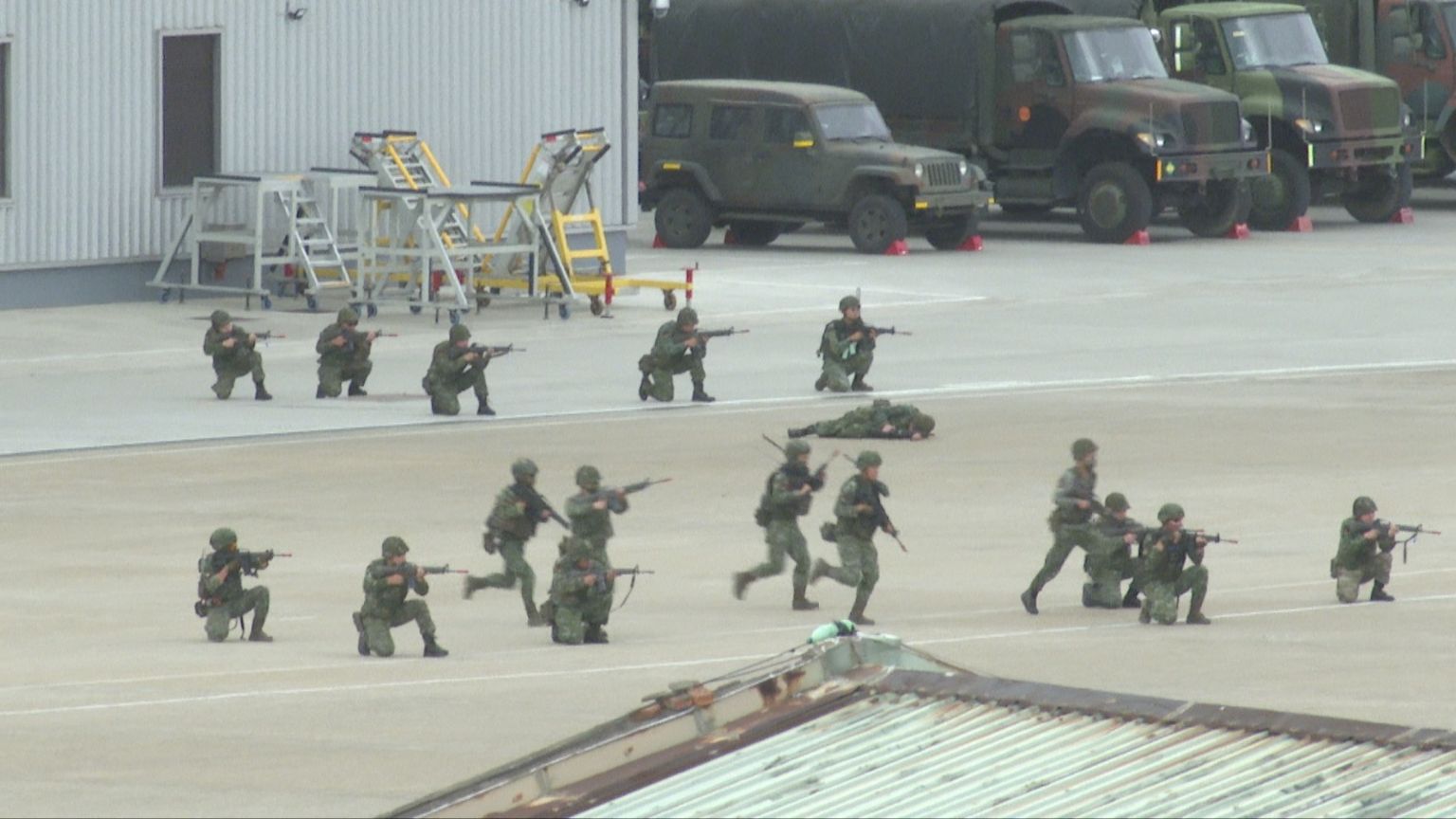
“So we know that it has that deadline” says Prof Palatano. “However, the use of force is not the first option. It is the option only if everything else fails. The objective is not the use of force per say, but having Taiwan capitulating, because it understands that coming back home is inevitable.”
It’s called coercive diplomacy, and the objective is to convince the people and government of Taiwan that resistance is futile.
The squeeze has already begun. In the first six months of this year the number of incursions into Taiwan airspace by Chinese military aircraft is up more than 60% compared to the same period last year. Beijing is now continuously pushing the limits, creating a “new normal”.
Taiwan has a lot to do.
It is moving to increase military service to one year, from the current four months. It is revamping its military strategy to make the island more resilient to cyber-attack, and actual attack.
It is following Ukraine in buying lots of smaller but more mobile missile systems that can be used against tanks, ships and aircraft and is also about to launch its first home-built submarine. But many of its conscript soldiers remain woefully under trained, and its weapons systems and military doctrine old and out of date.
There is one thing that is very striking. Despite the hugely disproportionate scale of China’s economic and military strength, the psychological pressure does not seem to be working. More than 70% of Taiwanese now say they would fight to defend their island home. So far they do not believe resistance is futile.
PM vote possible on Aug 4
Everything hinges on charter court decision on Aug 3, says Parliament president Wan
PUBLISHED : 27 Jul 2023 at 14:58

Parliament will convene on Aug 4 but whether a vote for prime minister takes place will depend on what the Constitutional Court does the day before, according to Parliament President Wan Muhamad Noor Matha.
Mr Wan said on Thursday that the Constitutional Court was likely to decide on Thursday, Aug 3 whether to accept a petition related to the previously rejected renomination for prime minister of Move Forward Party leader Pita Limjaroenrat.
If the court does not accept the petition, parliament could hold a vote for prime minister the following day, said Mr Wan, who is also the House speaker. If it accepts the petition, a parliamentary vote would not take place until the court issues its ruling, possibly a week later.
The next prime ministerial vote is expected to involve a candidate from the Pheu Thai Party, after Move Forward said it would step aside and let its coalition partner attempt to form a government.
A joint sitting of the House and Senate held its first vote for prime minister on July 13 when Mr Pita was the sole candidate. He failed to win a majority vote as many parliamentarians — including all but 13 of the unelected senators — expressed concern about his party’s strong intention to amend Section 112 of the Criminal Code, the lese-majeste law.
On July 19 parliament voted not to consider Mr Pita’s candidacy a second time. Members cited parliamentary regulations stating that a motion that fails once cannot be brought back during the same session. However, many legal experts said the selection of a prime minister is not a motion, and that what parliament did was unconstitutional.
The Move Forward Party was among a number of complainants that filed petitions against the decision with the Constitutional Court through the Ombudsman.
The Ombudsman decided to seek a judicial review and ask the court to postpone the prime ministerial vote to prevent any damage that would be difficult to fix.
Mr Pita pointed out that the parliamentary decision had set a risky precedent, since any prime ministerial candidate nominated from now on would have only one shot at securing a majority vote.
The charter court said this week that it would consider the petition on Aug 3 but did not specify whether it expected to reach a decision or issue a ruling the same day.
Allocation of powers in times of war: Israelâs case

The compounding impact of three events sheds light on Israel’s present upheaval concerning the allocation of power between its legislative and judicial branches.
One was the decision of David Ben-Gurion, Israel’s first prime minister, in 1948 exempting Ultra-Orthodox Jews from military service, which was supposedly to be of short duration but in fact is still in effect.
The second was the Supreme Court venturing into the constitutional void in matters of national security, particularly after the passing of a quasi-constitution (called Basic Laws) in 1992, inventing a fluid “reasonableness” doctrine. This doctrine drew on the legal philosophy of Aharon Barak, president of the Supreme Court between 1996 and 2005, that abstracted from realities of war and altered the meaning of a “Jewish state.”
Ben-Gurion believed that the exemption of Ultra-Orthodox, whose numbers stood then at 400, from serving in the army was justifiable, since the Holocaust had wiped out all the European Jewish centers of learning. Today though, there are 1.3 million Ultra-Orthodox (Israel’s population stands at 9.34 million), 60% under the age of 20, and 70,000 studying in this group’s institutions (called “yeshiva,” which means “sitting”).
It is a poor population, both men and women working few hours, living off grants and subsidies. The men are eternal students. The women take care of children: The group’s fertility rate is 6.6, though they work outside the home too. With such numbers, what started as a marginal issue becomes a serious political one as members of this group vote.
In 1970, a petitioner complained to the Supreme Court that by continuing to grant exemptions from military service to yeshiva students, the defense minister was abusing his power. The court dismissed the case, declaring that it was political and not for the court to decide.
‘Equality before laws’
In 1981, lawyer Yehuda Ressler went to court with the same complaint. The Supreme Court ruled as in 1970. In 1986, Ressler tried again and, with Justice Aharon Barak on the panel – who turned out to be the force behind the Supreme Court’s intense activism since 1992 – the court determined the matter to be “justiciable,” the legal term defining whether the courts could debate the issue to start with.
What are the implications of such a decision on the ground, a decision drawing on Barak’s view that the principle of “equality before laws” is above a collective right to security even in Israel?
If all young men must serve three years in the army, two issues related to the situation on the ground come up. How to execute such a decision when the number of Ultra-Orthodox students stands in the tens of thousands? Who would drag them from their studies and families to the army camps?
Such a decision was enforceable when the numbers were small. Today’s large numbers make it impossible, illustrating how the combination of entitlements and demography can become a political minefield.
The solution is political, not legal. The first role of the state is to protect against violence. Having young secular Israelis, women and men, serve years in the army while increasing numbers of heavily subsidized Ultra-Orthodox memorize and debate ancient texts is a recipe for diminished security and morale.
It’s a political problem. By gradually diminishing entitlements, the size of the Ultra-Orthodox community would shrink.
If the principle of “equality before laws” dominated all other concerns, it would run into another fact on the ground. Israel’s Arab population is 1.6 million, and is exempt from military service too (though 1% of its youth volunteer to serve).
By letting the Arab population continue to be exempt from obligation to serve, the court would acknowledge that certain issues are not justiciable and the notion of “equality before laws” is not the overruling principle when there are constant foreign and domestic threats of violence.
How did the Supreme Court reach the conclusion that matters of war and foreign policy are justiciable?
In his “Constitutional Revolution: Israel’s Basic Laws,” Barak states that “The principal organ of state that must pour content into the Basic Laws’ majestic generalities is … primarily the Supreme Court,” and concludes that “the rule of law, equality and human rights are the security of the state.”
Not quite. President Abraham Lincoln suspended habeas corpus during the American Civil War though it was unconstitutional; the US interned hundreds of thousands of Japanese-American citizens during World War II; and under McCarthyism during the Cold War, the US violated many cherished rights.
Although the US reversed those policies, Barak argues that wartimes in the US were rare, giving time to return to cherished democratic principles. Israel, however, having been continuously at war for its 75 years of existence, does not have this luxury.
Deviating from “democratic principles,” Barak speculates, would become established principles that even eventual peacetime governments would not reverse. Therefore, rights should be independent from realities on the ground, wars in particular.
This is how the debate in Israel turned into one about democracy vs tyranny – nothing to do with left, right and superficial “isms.”
Drawing on this same argument, and noting that the fundamental values of Judaism are “love of humanity, sanctity of life, social justice, doing what is good and just,” Barak erases all distinction between a “democratic” and a “Jewish state” – though the latter is the defining feature of the new state in Israel’s Declaration of Independence in 1948.
Barak reduces the meaning of the “Jewish state” to one distinguishing feature: “Jews have the right to immigrate there, and that their national experience is that of the state.”
Are young secular Israelis then assumed to sacrifice their lives for Jews in the Diaspora having the right to migrate to Israel when in the mood or when forced by circumstances?
The Supreme Court’s “reasonableness” doctrine, making it justiciable to overrule everything, including political and security matters and appointments, and altering the meaning of words in the name of ahistorical principles fitting peacetime, is key to Israel’s present domestic upheaval about the allocation of powers.
But maybe more: Ben-Gurion wanted Israel to become a nation like all others. Seventy-five years of warfare prevented this goal, though it shaped secular generations who have increasingly less in common with Jewish communities before World War II, with the Jewish Diaspora now, and with large segments of Israel’s observant – though not Ultra-Orthodox – population.
China suspected of building aircraft carrier base in Cambodia

China may have built its second overseas military facility, this one in Cambodia, centered on a pier that can host one of its aircraft carriers, enabling power projection and helping to resolve its “Malacca Dilemma.”
This month, Nikkei reported that China had made significant progress on building a naval base in Cambodia and was close to completing a pier that could berth an aircraft carrier. That report said that satellite images taken by BlackSky, a US commercial imagery company monitoring the construction at Cambodia’s Ream Naval Base, shows a nearly complete pier that closely resembles China’s pier at its only acknowledged overseas base in Djibouti.
In April, Asia Times reported China’s construction of an air defense center and expanded radar system near Ream Naval Base. Cambodian Prime Minister Hun Sen allocated 157 hectares for the project in September 2022, and an additional 30 hectares were earmarked for a naval radar system.
A Cambodian Defense Ministry official said there would be no Chinese funding, support, or presence in those facilities amid persistent allegations that Ream Naval Base is being secretly developed as China’s surveillance hub for the South China Sea and its first foreign military base in the Indo-Pacific region.
Previously, Asia Times reported in January 2022 on China’s dredging projects at Ream Naval Base to enable the docking of larger vessels, with Cambodian officials confirming that China had funded the project and other infrastructure construction at the facility. China’s dredging project represents a significant upgrade as, at the time, the base’s shallow waters only allowed it to host smaller patrol vessels and not substantial warships.
Nikkei’s new report says the first signs of the Ream pier construction were reported in July 2022, with China making rapid progress. The source says that the piers at Ream and Djibouti both have a 335-meter section could be used to berth an aircraft carrier.
Nikkei notes that in a confrontation, the US could bomb Chinese military facilities in the South China Sea, but attacking Ream would mean bombing Cambodia. Despite that, the source cites a Chinese Embassy official in the US that Cambodia’s constitution bans foreign military bases on its territory and that construction at Ream strengthens Cambodia’s capacity.
Myanmar activity
China may have been behind similar projects in Myanmar, enabling it to secure a foothold in the Andaman Sea to bypass its long-running strategic conundrum wherein its over-dependence on the Malacca Strait makes it vulnerable to a naval blockade by the US and its allies.
In April, Asia Times reported on renewed construction activities on Myanmar’s Great Coco Island, with satellite imagery showing a freshly lengthened 2,300-meter runway and signs of increased activity in recent months, such as the construction of hangars and a radio station.
Since 2014, there have been reports of Chinese signal intelligence (SIGINT) facilities in the Andaman Sea, including at Manaung, Hainggyi, Zadetkyi, and the Coco Islands, while Chinese technicians have worked on radar stations and naval bases near Yangon, Moulmein and Mergui.
From Ream, China could counter US naval presence in the Malacca Strait chokepoint, secure its emerging interests in the Gulf of Thailand, and establish a southern flank in the South China Sea.
Conversely, Cambodia depends on China as an economic lifeline and a possible security insurance against its larger and militarily stronger neighbors, Thailand and Vietnam.
Also, China’s SIGINT facility on Myanmar’s Great Coco Island may serve as a forward defensive position for Kyaukpyu Port, the maritime terminus of the China-Myanmar Economic Corridor (CMEC), which ends south of China’s Yunnan province.
It may also give China an advantage against the Indian Navy, as Myanmar can conduct surveillance flights from Great Coco Island to monitor Indian operations from the Andaman and Nicobar Islands.
China could then bargain with Myanmar to share intelligence from those flights in exchange for economic and political support, which the latter badly needs, embroiled in an ongoing civil war and dealing with Western sanctions.
However, China’s moves to establish a foothold near the Malacca Strait, South China Sea, and Indian Ocean are far from a done deal, as unreliable relationships, unstable host countries, and limited near-term naval power in the Indian Ocean have prevented China from establishing a dependable network of naval bases to secure its sea lanes of communication in the event of a military conflict.
Changes in Cambodian policy
Further, Cambodia may not be China’s “yes man,” contrary to its previous behavior and expectations.
In a March article in Fulcrum, Melinda Martinus and Chhay Lim report that Hun Sen’s January 2022 visit to Myanmar was viewed as Cambodia acting on the behest of China, with the July 2022 execution of pro-democracy activists by Myanmar’s junta marking a turning point for Cambodia, leading it to re-engage with ASEAN counterparts and disinvite the junta from ASEAN meetings during its chairmanship.
Martinus and Lim also note that Cambodia has condemned Russia’s February 2022 Invasion of Ukraine and provided humanitarian assistance to the latter. They note that Cambodia’s moves were a surprise, as it was expected to follow China’s position of refusing to condemn Russia for its actions and considering its cordial relations with the latter.
Martinus and Lim also say that during its chairmanship of the Association of Southeast Asian Nations, Cambodia made notable efforts to steer itself away from China’s direct influence, especially when doing so is perceived to be relatively cost-free.
The writers say Cambodia is diversifying its relationships to lessen its dependence on China. They report that Western approval of its condemnation of Russia’s invasion of Ukraine was seen as a preparatory move for the incoming Hun Manet cabinet, which may reset ties with the West.
In addition, they noted that Cambodia signed a free-trade agreement with South Korea last year, which could lessen economic over-dependence on China.
In the case of Myanmar, Sudha Ramachandran wrote last month in an article for the Jamestown Foundation that China’s decision to back the Myanmar junta is fraught with risk, as resistance groups target Chinese nationals and projects.
Ramachandran cites that of the 7,800 recorded nationwide clashes since the February 2021 coup, 300 occurred in areas where major Chinese projects are located, with 100 happening in 19 townships where China’s oil and natural-gas pipelines run.
He also says that Myanmar’s military may not be the formidable fighting force it is believed to be, as it is much smaller than previously thought. He notes that Beijing’s pumping the junta with weapons can only serve to deepen anti-China animosity by resistance groups, putting Chinese projects and nationals in Myanmar at greater risk.
Ramachandran also states that while Myanmar’s civil war is at a stalemate and the junta has a tenuous grip on power, the military’s hold on the territory is expected to decline.
Thaksin can seek royal pardon: Wissanu
PUBLISHED : 27 Jul 2023 at 14:18

Former prime minister Thaksin Shinawatra can petition for a royal pardon on the first day of his imprisonment, acting Deputy Prime Minister Wissanu Krea-ngam said on Thursday.
“All inmates have the right to seek a royal pardon on the first day of imprisonment because this right is available during the time of punishment,” said Mr Wissanu, is also acting as the justice minister. Somsak Thepsuthin resigned as justice minister to join the Pheu Thai Party in March.
“If the pardon is not granted after the petition is lodged, it cannot be repeated within the following two years,” Mr Wissanu said.
Upon Thaksin’s return, he will go to court to receive an imprisonment order for his three cases, which have been finalised, resulting in a combined jail term of 10 years, said Mr Wissanu.
Some of the cases have passed their statutes of limitations, and others have not yet reached a court, including the case concerning Thaksin’s escape from the country.
Corrections officials are already prepared to receive the former prime minister, as he had earlier announced his return for his birthday, Mr Wissanu said. Thaksin turned 74 on Wednesday and has lived in self-imposed exile for 15 years.
Thaksin will be treated differently from general inmates due to his age, being older than 60 years. Ill inmates are also eligible for some privileges, which are standard for those who meet the relevant criteria, said the deputy prime minister.
Although there are special rooms at prisons, their use depends on the Corrections Department, and Mr Wissanu said he does not believe that Thaksin could be detained outside of prison.
“He will go to jail however,” Mr Wissanu confirmed. Family members can receive him at (Don Mueang) airport and visit him at prison right away, he added.

Sitthi Sutheewong, deputy director-general of the Corrections Department, said on Thursday that all new inmates would be quarantined for Covid-19 observation for five days, and there are special quarantine rooms for elderly inmates.
Inmates with underlying illnesses may be sent to corrections hospitals for appropriate care.
Thaksin has lived in self-imposed exile abroad since fleeing the country after receiving bail to attend the 2008 Olympics in Beijing.
Shortly before October 2008, the Supreme Court’s Criminal Division for Holders of Political Positions sentenced him in absentia to two years in prison for being found guilty of abuse of authority in assisting his then-wife, Khunying Potjaman na Pombejra, in winning a bid for the Ratchadaphisek property.
Singapore cannot allow public trust in institutions to erode: Edwin Tong
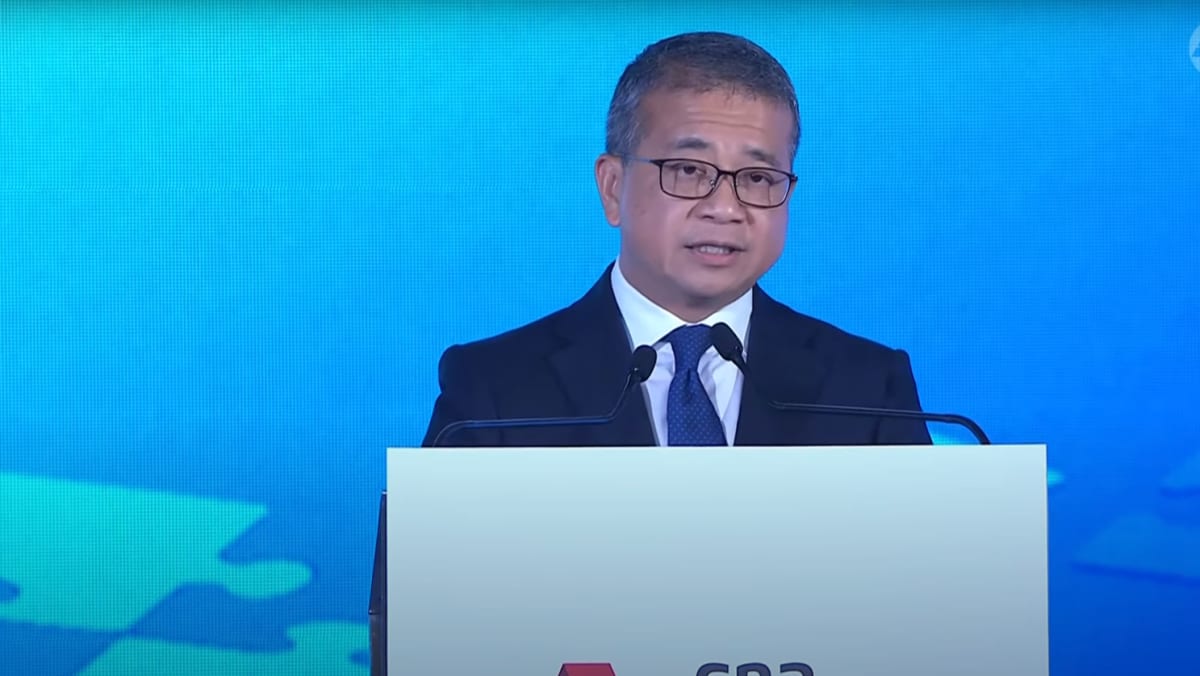
TRUST UNDER THREAT
At the same time, the data shows that public trust levels have been falling around the world, said Mr Tong.
He highlighted three forces that tend to weaken public trust. First, “anti-establishment populism” where political parties move to the extremes of the political spectrum, resulting in outcomes like Brexit.
Second, the rise of social media, which has accentuated a “post-truth environment” where truth and facts could be less relevant when trying to shape public opinion.
In this environment, “people say what they want to say, often using divisive rhetoric as a clickbait” while remaining anonymous, said Mr Tong.
Third, lines being increasingly drawn based on identity, with people more mindful of their differences rather than what they have in common, hence leading to more divisiveness.
“These collective factors mean that we will continue to be challenged in the foreseeable future. Public trust will come under increasing pressure,” he said.
The government must therefore actively build public trust, and Mr Tong pointed to the Forward Singapore conversations to review the country’s social compact as one way.
Singapore is facing a number of inflexion points, he said, citing the country’s quickly changing demographic and newer aspirations that must be met.
“Our society can only advance and resilience be built when everyone recognises they have a place in this society, where they can realise their aspirations fully, where they feel cared for and included. That is our challenge.”
Effects of climate change increasing in Asia, WMO says
GENEVA: Extreme weather events ranging from droughts to large-scale floods and other effects of climate change are on the rise in Asia and bound to affect food security and the continent’s ecosystems, the World Meteorological Organization (WMO) said. In a report published on Thursday (Jul 27), WMO said that AsiaContinue Reading
110 people infected with Zika since Jan – health ministry
PUBLISHED : 27 Jul 2023 at 13:15

A total of 110 people have been infected with the mosquito-borne Zika virus since January this year and the number of infections has continued rising since May, according to the Public Health Ministry.
From Jan 1 to July 19, there were 110 reported cases of the Zika virus in 20 provinces, Dr Opas Karnkawinpong, permanent secretary for public health, said on Wednesday. The highest number of infections were reported in June, with 30 cases, he added.
In July, the virus has so far infected six pregnant women in five provinces – two in Chanthaburi and one each in Phitsanulok, Rayong, Samut Songkhram and Trat. The disease might pose a greater risk of miscarriages or microcephaly, a birth defect that leads to smaller-than-average head size in babies, Dr Opas warned.
Health officials closely followed up on 241 pregnant women infected with Zika between 2016 and 2022. Among them, four experienced miscarriages, three gave birth to babies with microcephaly, all testing positive for the Zika virus.
The officials had also followed up on child development of 77 cases for two years and four cases were found to have abnormal development, he said.
Clinical surveillance of 2,187 newborns identified three cases of abnormalities associated with Zika infections. Officials followed up on child development of four cases for two years, and three of those cases showed development abnormalities.
Dr Opas said Zika infections have been found in pregnant women this year, and the disease has spread across all regions of the country, mostly in areas where dengue fever outbreaks occurred.
He has ordered provincial health offices to conduct health screening of patients, particularly pregnant women in communities, displaying at least one symptom such as rashes, fever, joint pain and conjunctivitis (pink eye).
Health volunteers have been instructed to encourage the public to help get rid of breeding grounds for mosquito larvae in their communities.
Global VC investment remains muted, falling to US$77.4bil across 7,783 deals in Q2â23
KPMG Private Enterprise’s Venture Pulse shows AI startups still hot
VC deals in Asia drop from US$22.9bil across 3.1k deals to US$20.1bil
Chock full of data professional services firm KPMG issued its Venture Pulse Q2’23 report of the state of global venture capital investment with the headline figure showing that VC funding…Continue Reading
Why is Hezbollah poking Israel?

Nearly 20 years after its war with Israel, Hezbollah, with its persistent harassment of the Jewish state across Lebanon’s southern border, seems to be itching for a rematch. Why the militia is dragging a failing country to war is anyone’s guess.
In recent weeks, Hezbollah chief Hassan Nasrallah has renewed discussion of the 2006 war’s unfinished business. That conflict ended with the status of 13 border points unsettled, along with the fate of Shebaa Farms, a small strip of disputed land near the Golan Heights.
In the latter’s case, ownership should have been negotiated a month after the war, per UN Security Council Resolution 1701. But that never happened.
Nasrallah has justified his newfound urgency by saying that a year ago, Israel began constructing a fortified border wall to replace the flimsy barbed wire.
He added that Hezbollah isn’t seeking the demarcation of the land border between Israel and Lebanon, a process he rejected last October when the two sides set their maritime borders. Rather, he wants Israel to withdraw from every territory that Lebanon claims, without negotiations.
Why is Nasrallah trying to shake up the border now?
One theory is that he’s trying to renegotiate the rules of engagement with Israel, currently set at near-zero tolerance toward any cross-border attacks. Another suggests that Nasrallah wants to deflect Lebanese attention away from domestic misery in a country where the economy has been in free fall for years.
To spite Israel, Hezbollah erected tents on Shebaa Farms. Israel then lobbied world capitals to persuade the militia to remove them. If Hezbollah refuses, it’s not clear how far the Israeli government is willing to go to force the issue.
If border clashes escalate, Nasrallah said he’s confident of yet another victory – like the one he imagined in 2006 and the one that Hamas claimed in 2021.
Backing by Iran
Nasrallah insists that not only is his militia better armed and stronger than before, it would also be supported by pro-Iran militias like Hamas, Palestinian Islamic Jihad, and Iraqi Popular Mobilization Units that would “unify the fronts” and wage war on Israel simultaneously. But even then, it isn’t clear how Nasrallah can overpower Israel and force it to concede on any issue.
In the event of full-scale war, Hezbollah and Hamas would likely fire an unprecedented number of rockets in a bid to overwhelm Israel’s Iron Dome, hoping that some rockets sneak through.
Iran has supplied Hezbollah with explosive drones and precision-guided missiles (PGMs). As Iron Dome gets jammed, Hezbollah would then use its bigger rockets to strike strategic Israeli assets – such as Ben Gurion Airport, oil installations, chemical plants, and densely populated areas.
The Israeli Air Force (IAF) would be busy preempting or retaliating against the militias’ launchpads.
It’s possible that both Hezbollah and Hamas have dug tunnels that can transport their fighters behind Israeli lines. Such tunnels aren’t as dangerous as they sound because they are bottlenecks that force fighters to trickle into Israel, and only with light arms.
Tunnels wouldn’t enable the massing of Hezbollah or Hamas fighters or the shuttling of heavy arms needed to battle effectively with Israel Defense Forces (IDF). Still, militants behind Israeli lines could take hostages or briefly control a town, either of which would be an enormous publicity victory.
If Hezbollah or Hamas decided to walk into Israeli territory, Israel’s undisputed control of airspace would decimate the invading fighters. That was the main reason Israel reversed its fortunes against Egypt and Syria in 1973. When Egyptian ground troops exited their surface-to-air missile umbrella, the IAF took them out, clearing the way for a counterattack.
Nasrallah’s continuous bragging of how the days of humiliation are gone gives the impression that Iran and its militias have attained unprecedented power. But Israeli firepower dwarfs that of Iran and its militias combined. Israel enjoys a qualitative military edge over Iran that is bigger today than it was between Israel, on one hand, and Egypt and Syria, on the other, in 1967 and 1973.
Consider that in the 1967 war, when Arab armies suffered their worst defeat, they still managed to kill close to 800 Israeli troops, down 32 fighter jets, and destroy 400 tanks. Today, Iran and its militias don’t have the capacity to inflict a fraction of such losses on Israel.
This means that while Hezbollah and Hamas can disrupt Israeli life and give the Jewish state a bloody nose, they cannot cause enough Israeli alarm to call for general mobilization. As long as that’s the case, wars that Iranian militias launch on the Jewish state will remain border skirmishes, with militias inflicting minor damage on Israel and Israel responding with devastating force.
In 2006, Israel razed large swaths of Lebanon and its infrastructure. Had it not been for Arab states’ largesse that funded reconstruction, parts of Lebanon would still be under rubble.
This time, if Nasrallah drags Lebanon into another war with Israel, wealthy Arab countries will be loath to bail it out. Lebanon will just die, and maybe Gaza, too.
This article was provided by Syndication Bureau, which holds copyright.

